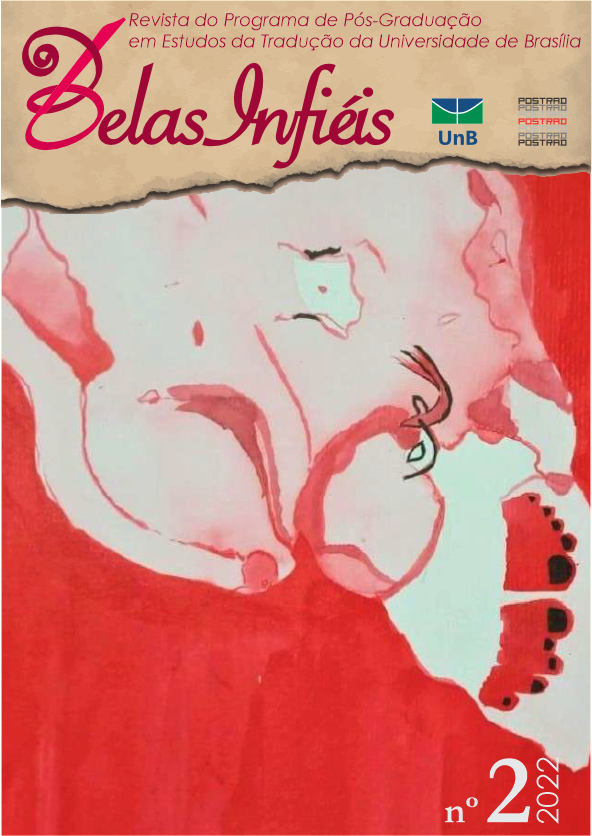Crear(se), reescribir(se), traducir(se): posturas literarias y posturas políticas en autoras y traductoras contemporáneas
DOI:
https://doi.org/10.26512/belasinfieis.v11.n2.2022.43016Palabras clave:
posturas de autor/a – discurso literario- traducción – género.Resumen
El proyecto de investigación Crear(se), rescribir(se), traducir(se): posturas literarias y posturas políticas en autoras y traductoras contemporáneas (2020-2024), radicado en el Laboratorio de Investigaciones en Traductología (LIT-IdIHCS-UNLP), indaga sobre las mutaciones en las prácticas y en los discursos literarios contemporáneos a partir del concepto de postura de autor/a que revisa y describe el hecho literario a la luz de las constantes articulaciones entre lo individual y lo colectivo desde una perspectiva sociológica (Meizoz, 2007, 2011). Siguiendo este desarrollo crítico y teórico, nuestro trabajo propone un análisis de la emergencia de las tensiones, relaciones y construcciones de sí presentes en las producciones discursivas de autoras francófonas y traductoras contemporáneas que buscan subvertir al lenguaje patriarcal y reivindicar ideas feministas y políticas. La perspectiva teórica que adoptamos nos ha permitido asumir una mirada compleja del hecho creador y discutir concepciones tradicionales de los procesos de escritura y traducción a partir de la articulación de conceptos provenientes de enfoques discursivos, literarios, traductológicos y sociológicos. Integramos las dimensiones retórica y discursiva que se inscriben en la perspectiva del ethos discursivo de Maingueneau (2004, 2015) y Amossy (2010, 2012) con la dimensión comportamental o hexis corporal, según Bourdieu (1980 [2017]). El corpus analizado incluye textos escritos por autoras y traductoras que marcaron la literatura en sus lenguas de escritura y traducción como Aurora Venturini, Violette Leduc, Marguerite Duras, Laura Alcoba, Annie Ernaux, Joséphine Bacon, Natasha Kanapé-Fontaine y An Antane Kapesh.
Descargas
Citas
Amossy, Ruth. (2010). La présentation de soi. Ethos et identité verbale. Paris: PUF.
Amossy, Ruth. (2012). L’argumentation dans le discours. Paris: Armand Colin.
Bourdieu, Pierre. (1980 [2017]). Le sens pratique. Paris: Éditions de Minuit.
Castro Vázquez, Olga (2008). Género y traducción: elementos discursivos para una reescritura feminista. Lectora, 14, 285-301.
Lefevere, André. (1992). Translation/History/Culture: a sourcebook. Londres y Nueva York: Routledge.
Lefevere, André. (1997). Translation, Rewriting and the Manipulation of Literary Fame. Londres y Nueva York : Routledge.
Maingueneau, Dominique. (2004). Le Discours littéraire. Paratopie et scène d’énonciation. Paris: Armand Colin.
Maingueneau, Dominique. (2015). Escritor e imagen de autor. Tropelías. Revista de Teoría de la Literatura y Literatura Comparada, 24 (2015), 17-30. Traducción del francés de Carole Gouaillier.
Meizoz, Jérôme (2007). Postures littéraires. Mises en scène modernes de l'auteur. Ginebra: Éditions Slatkine.
Meizoz, Jérôme. (2011). La Fabrique des singularités. Postures littéraires II. Ginebra: Slatkine Érudition.
Sporturno, María Laura. (2019). La conquista del espacio enunciativo. Un estudio de las notas en la traducción al español de Borderlands/La Frontera. Lengua y Habla (23). Universidad de los Andes, 360-379. Recuperado de: https://www.redalyc.org/journal/5119/511966657019/html/
Suchet, Myriam. (2010). Textes hétérolingues traduits: de «la langue» aux figures de l’énonciation. Pour une littérature comparée diferentielle. Montreal, Quebec, Canadá. Tesis doctoral presentada en el Centre for Interdisciplinary Studies in Society and Culture.
Descargas
Publicado
Cómo citar
Número
Sección
Licencia
Derechos de autor 2022 CC BY

Esta obra está bajo una licencia internacional Creative Commons Atribución 4.0.
Copyright Statement
Given the public access to this journal, the texts are free to use but requires the recognition of the original authorship and initial publication in this journal to be properly stated.
The journal allows the use of works published for non-commercial purposes, including the right to submit the work to publicly accessible databases. Published contributions are the sole and exclusive responsibility of the author(s).
- When submitting papers to be evaluated by the Belas Infiéis journal, the author(s):
- Declare that the contents of the contributions are original and of their original creation, being entirely responsible for their content if there is an objection by third parties.
- Claim to be aware that they should not commit academic plagiarism.
- Declare that the manuscript has not been published, completely or partially, in Portuguese or another language. If it is a translation it should be submitted to the Translated Articles section.
- Declare that the manuscript is not being evaluated by other journals.
- Declare that the manuscript was not submitted to another journal simultaneously.
- Commit(s) to inform the journal of any kind of error or inaccuracy in their contribution (published, in evaluation or in editing) and to collaborate with the editors to make due corrections of the article (when in evaluation or editing) or erratum/retraction (after publication).
- Declare that there is no conflict of interest regarding the published work.
- Authorize its release if it is accepted for publication without any kind of monetary compensation.
- Agree to assign non-exclusive rights to publication to the magazine, remaining free to make their contribution available in other media as long as the publication of the first version in Belas Infiéis magazine is mentioned. They also authorize Belas Infiéis to assign their texts for reproduction in content indexers, virtual libraries and similar platforms.
- Maintain copyright and grant the journal the right of first publication, the work being licensed under theCreative Commons Attribution License.
- Is/Are allowed and encouraged to publish and distribute their work online after the editorial process, which may increase the impact and citation of the published work.
- Authorize the editorial team to make textual adjustments and to adapt the article to the publication rules, when necessary.



















